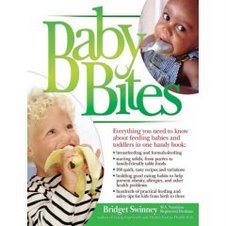Now that organic has gone mainstream, it's more affordable. Now that you have a baby, you're probably thinking more about the environment and how the environment affects your baby's health. That thought process usually leads to the question.....
Should you buy organic for your baby?
YES.
WHY? Pesticides are chemicals meant to kill bugs, mold and other things that hinder a plant's growth and development. Common sense dicates that they can't be good for humans--and science backs it up. Pesticides can be particularly harmful during periods of rapid growth--infancy, puberty, pregnancy--times when important organ systems are developing or growing rapidly. Some pesticides are thought to be endocrine disruptors, which could make a difference to the development of sexual organs.
Baby's First Food: Babies get only one source of nutrition--breastmilk (or formula) for the first 5-6 months. If you figure that all your baby's nutrition is coming from a single source, the quality of that food is of vital importance.
WHEN BREASTFEEDING:
Breastmilk, of course, is the gold standard for infant nutrition. If you're breastfeeding, it's a good idea to consider organic for yourself, at least for some of your foods. (see chapter 3 in Baby Bites for info on how to avoid other environmental chemicals while breastfeeding.)

If you're feeding your baby formula, or a combination of breastmilk and formula, there are several organic options:
Similac Organic
Earth's Best Organic (regular and soy)
Parent's Choice Organic (Available at Walmart)
Ultra Bright Beginnings Organic
Baby's Only Organic (Toddler regular and soy)
Baby Food: Making Your Own
When making your own baby food, (which is really easy especially if you use the simple guidance found in Baby Bites,) you'll want to use organic products, at least for the produce highest in pesticides. Remember that if you buy fresh organic produce, you want it to be as fresh as possible. Another option is to use organic frozen produce, such as Cascadian Farms.
The price of organic can still add up, so you might want to buy only the organic produce that has the most pesticides. The Environmental Working Group has compiled a list of the Best and Worst for pesticide residues. Find it at and more info at: http://www.foodnews.org/

Baby Food: Organic on the Grocery Shelf
At your local grocery, you'll find:
Earth's Best
Gerber Organics
You'll find more at stores like Whole Foods and Wild Oats:
Plum Organics (frozen)
Happy Baby (frozen)
Bobo Baby (in Canada)
Sweetpea (in Canada)
Additionally, there are some regional organic baby food companies:
World Baby Food-Seattle
Sprouts (home delivered Seattle)
Bohemian Baby (fresh organic) -Southern California
Full Tank Foods-L.A.
Homemade Baby-L.A.
My Nami-L.A.
The sales of organic baby food increased a record 21.6% last year--which means more choices, more competition and better prices for consumers. For current news about organic baby food, see http://www.msnbc.msn.com/id/18296482/
Should you buy organic for your baby?
YES.
WHY? Pesticides are chemicals meant to kill bugs, mold and other things that hinder a plant's growth and development. Common sense dicates that they can't be good for humans--and science backs it up. Pesticides can be particularly harmful during periods of rapid growth--infancy, puberty, pregnancy--times when important organ systems are developing or growing rapidly. Some pesticides are thought to be endocrine disruptors, which could make a difference to the development of sexual organs.
Baby's First Food: Babies get only one source of nutrition--breastmilk (or formula) for the first 5-6 months. If you figure that all your baby's nutrition is coming from a single source, the quality of that food is of vital importance.

WHEN BREASTFEEDING:
Breastmilk, of course, is the gold standard for infant nutrition. If you're breastfeeding, it's a good idea to consider organic for yourself, at least for some of your foods. (see chapter 3 in Baby Bites for info on how to avoid other environmental chemicals while breastfeeding.)

If you're feeding your baby formula, or a combination of breastmilk and formula, there are several organic options:
Similac Organic
Earth's Best Organic (regular and soy)
Parent's Choice Organic (Available at Walmart)
Ultra Bright Beginnings Organic
Baby's Only Organic (Toddler regular and soy)
Baby Food: Making Your Own
When making your own baby food, (which is really easy especially if you use the simple guidance found in Baby Bites,) you'll want to use organic products, at least for the produce highest in pesticides. Remember that if you buy fresh organic produce, you want it to be as fresh as possible. Another option is to use organic frozen produce, such as Cascadian Farms.
The price of organic can still add up, so you might want to buy only the organic produce that has the most pesticides. The Environmental Working Group has compiled a list of the Best and Worst for pesticide residues. Find it at and more info at: http://www.foodnews.org/

Baby Food: Organic on the Grocery Shelf
At your local grocery, you'll find:
Earth's Best
Gerber Organics
You'll find more at stores like Whole Foods and Wild Oats:
Plum Organics (frozen)
Happy Baby (frozen)
Bobo Baby (in Canada)
Sweetpea (in Canada)
Additionally, there are some regional organic baby food companies:
World Baby Food-Seattle
Sprouts (home delivered Seattle)
Bohemian Baby (fresh organic) -Southern California
Full Tank Foods-L.A.
Homemade Baby-L.A.
My Nami-L.A.
The sales of organic baby food increased a record 21.6% last year--which means more choices, more competition and better prices for consumers. For current news about organic baby food, see http://www.msnbc.msn.com/id/18296482/





3 comments:
I have loved all of Bridget's books! They are easy to read, full of great information, and have great recipes to encourage your children to eat right "from the beginning!" I find that I use these books often. I will make sure that I add Baby Bites to my collection.
Pconnor22
I am a mother of a 10 month old and a 26 month old.... and this blog and new book is music to my ears. I'm really looking forward to purchase it and start educating myself about what I put in my babies mouths. I am also a working mom so I specially appreciated the tips on cooking and working moms. I will be definitely adding this blog to my favorites!
Please read this new york time's article.
http://www.nytimes.com/2008/05/19/us/19formula.html
Similac organic is way sweeter than most formulas and has some major reprocussions. The others are still good choices though.
Post a Comment